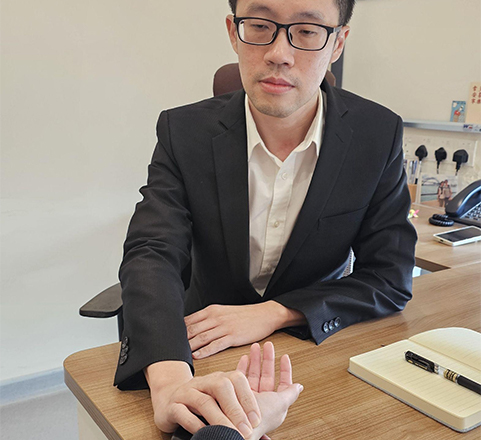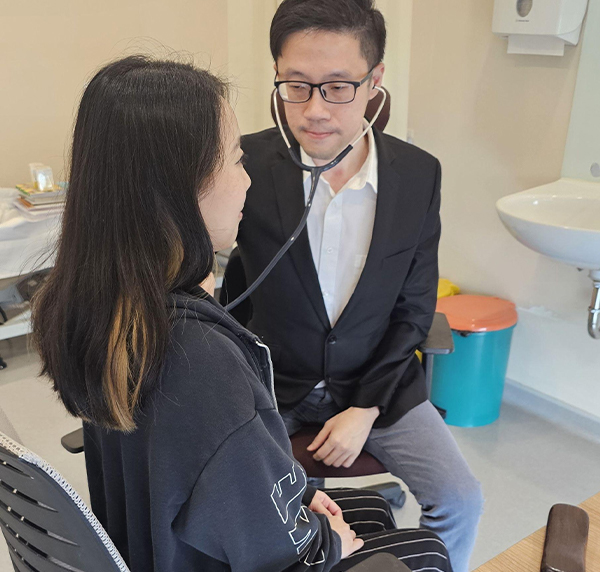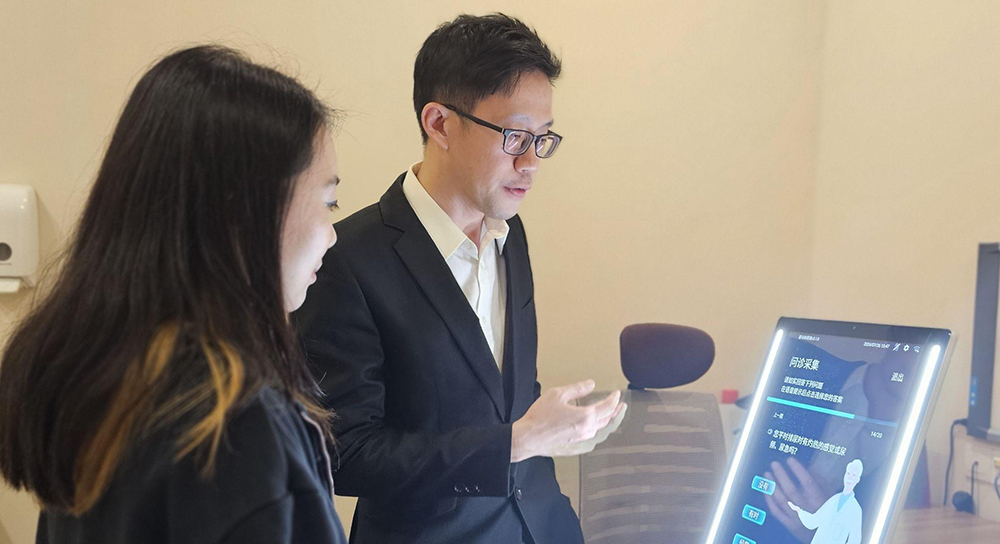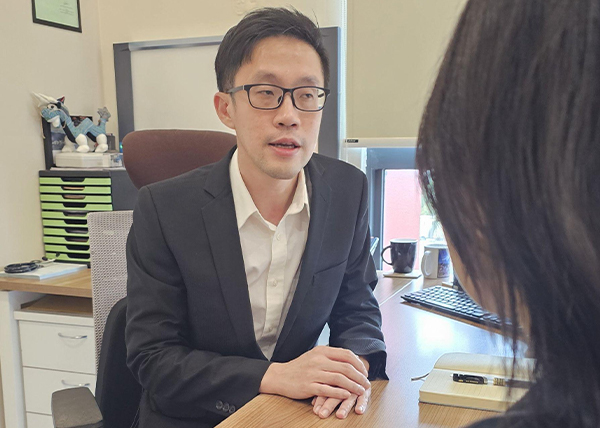Bridging East and West: Coffee Break with Dr Lim, Medical Director and Consultant for Traditional and Complementary Medicine
12 August 2024
Traditional Chinese Medicine (TCM) often faces scepticism and misconceptions within the medical community with many perceiving it as unscientific or less effective compared to Western medicine. Bridging this divide is Dr Lim Ren Jye, Medical Director and Consultant for Traditional and Complementary Medicine at Sunway Medical Centre, a unique practitioner with qualifications in both Western medicine and TCM. He is dedicated to integrating these two approaches to provide comprehensive, evidence-based care that leverages the strengths of both practices.
After graduating from the International Medical University in 2004, Dr Lim pursued TCM, earning his master’s degree by 2011 and a PhD in TCM Oncology in 2018. Currently, he serves as the Medical Director at Sunway TCM Centre. “My goal has always been to merge the best aspects of Western and Eastern medicine to offer patients the most comprehensive care possible,” he says.

Journey into Traditional Chinese Medicine
Dr Lim’s interest in integrative medicine was deeply influenced by his personal experiences with both Western and Eastern medical practices. “Growing up, I saw how both Western and Eastern approaches had profound effects on health,” Dr Lim recalls. A pivotal moment came when he suffered an ankle sprain during his school years. “Western medicine provided quick, but temporary, relief with pain medication. But once the medication wore off, the pain returned,” he explains.
This experience led Dr Lim to explore alternative solutions. “I realised that TCM offered more enduring relief through techniques like manipulation and herbal remedies,” he says. This sparked his fascination with how they could complement each other. Driven by this realisation, Dr Lim dedicated himself to understanding and integrating both disciplines to offer a more comprehensive approach to patient care.

Backed by Scientific Research
Dr Lim emphasises the importance of scientific validation in TCM. “We base our practices on scientific methods and evidence,” he notes. “Scientific methodology is crucial to validate our claims, including the effectiveness of ingredients. For instance, if patients have symptoms of dampness or heatiness, we need to understand the underlying causes and how TCM can address these specific issues.”
Dr Lim is particularly focused on the application of TCM in oncology, where precision is crucial. “In oncology, it’s imperative to be cautious and precise with our claims,” he explains. “We must ensure that our treatments do not interfere negatively with conventional treatments but rather complement them.” His research has revealed that certain herbal remedies can be effective in managing side effects from treatments like radiation, which often leads to oral dryness.
“Our studies demonstrated that specific herbs could significantly improve mucosal tissue regrowth and enhance secretions,” he adds. “During a clinical study, we treated patients who experienced oral dryness as a side effect of radiation therapy. By incorporating particular herbal formulations, we found that these remedies could help alleviate dryness and promote better oral health. This approach provided a much-needed solution for managing side effects and improving patients' quality of life.”
Misconceptions About TCM
Dr Lim acknowledges the historical and practical challenges faced by TCM. “Historically, there has been a significant gap in the interaction between Chinese and Malaysian practices,” he notes. “In the past, TCM training was often passed down through generations with little formal structure or scientific backing. Many practitioners learned techniques informally, leading to inconsistent quality and lack of standardisation.”
He continues, “In contrast, Western medicine benefits from a structured education system and standardised training. The lack of formalisation in TCM has led to varying levels of competency among practitioners and sometimes poor outcomes.” Dr Lim highlights ongoing issues in TCM practice, including the misuse of herbal remedies and misunderstandings about their effects.
“Some local practitioners might use unverified remedies or traditional practices without scientific support, which can lead to complications or ineffective treatments,” he says. “It’s essential to differentiate between well-documented, scientifically validated practices and those lacking rigorous validation.”

Regulating TCM Practices
Dr Lim’s involvement in the regulatory framework for TCM reflects his commitment to advancing the field. “When I first joined the Traditional and Complementary Medicine Division in 2007, I was keen to contribute to drafting a new act for TCM,” he recalls. “I was involved in creating provisions for TCM practitioners, including registration and enforcement measures. We successfully passed the bill in 2016, introducing several important provisions.”
He explains, “The new act established a structured framework for TCM practice, including registration requirements and enforcement mechanisms. We aimed to ensure that only qualified practitioners could register and practice and that enforcement actions could be taken against those who did not comply with standards.” Dr Lim emphasises the importance of these regulatory measures for patient safety and quality of care. “For future patients seeking TCM practitioners, it’s crucial to ensure they are registered and qualified. The regulatory framework helps maintain high standards and protects patients from unqualified practitioners,” he advises.
Enhancing Doctor-Patient Communication
In his effort to improve communication and understanding between doctors and patients, Dr Lim has also ventured into writing. “This book is a guide for doctors to speak in layman's terms rather than using complex medical jargon,” he explains. “Doctors often have limited time and many patients, making it challenging to explain things clearly. We need to bridge this gap and provide information that’s accessible to everyone.”
He notes that his book aims to address the limitations faced by doctors in patient communication, saying, “We’re all busy, and sometimes the focus on technical accuracy leads to poor patient relations. This book is meant to help doctors explain concepts more engagingly and understandably, making it easier for patients to grasp important information.”

Building a Legacy of Excellence
Dr Lim’s approach to building a legacy in integrative medicine involves a long-term vision and commitment to quality. “When you’re in a position of influence, it’s important to think about the long-term impact,” he says. “It’s not just about fulfilling immediate goals but about creating a sustainable legacy for future practitioners and patients.”
His advice to aspiring TCM practitioners is clear. “Do the right thing and stay committed to your goals,” Dr Lim advises. “Whether you choose TCM or Western medicine, focus on the effectiveness of your interventions and strive to be the best in your field. Success comes from dedication and skill, not just from choosing a particular path.”
Thank you, Dr Lim, for your significant contributions and your dedication to integrating Eastern and Western medicine. To learn more about our holistic treatment options, feel free to contact our TCM department.






